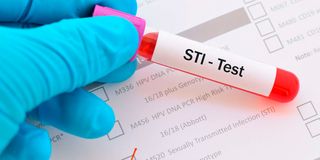Alarm as new STI strains discovered

Researchers find new strains of chlamydia and gonorrhoea among women in the border county of Busia.
Medical workers have warned Kenyans to be vigilant following the discovery of two new strains of sexually transmitted infections (STIs).
Scientists at the Kenya Medical Research Institute (Kemri) have found two new mutations they say have not been seen before in genes associated with gonorrhoea and chlamydia in the country. The discovery came as investigators sought to understand why two hospitals in Busia County, which borders Uganda, was recording rising cases of STIs.
Prof Samson Muuo, the assistant principal research scientist at the Center for Microbiology Research at Kemri, disclosed that researchers were shocked to find that all 424 Kenyan women aged 15 years and above sampled from the two hospitals tested positive for gonorrhoea and chlamydia.
“This information was collected under socio-demographic characteristics that are still under analysis and so we will soon know how many used protection, the histories with using antibiotics as many indicated they have used them before , comorbidities if any and if they have had similar infections before,” Prof Muuo said.
“The two new mutations we identified in MtrR and 23S rRNA genes associated with macrolide resistance were not from a common ancestral origin from the previous reported one. Busia being a border town gives an interesting approach about the disease's spread. Hypothetically, it can be assumed that these mutations will spread between the two regions,” he added.
Macrolides are a class of drugs used to manage and treat various bacterial infections.
“Using consecutive sampling, endocervical swabs were collected from women who presented with symptoms of STIs . Neisseria gonorrhoeae, Chlamydia trachomatis and Mycoplasma genitalium were detected from all 424 women who met inclusion criteria,” the findings state.
“Sequencing for the macrolide-resistant genes of interest was subsequently done and data analysed for point mutations and evolutionary relationships,” the researchers said, while further explaining that the study targeted a molecular approach to identify and study genes that are associated with drug resistance for these diseases.
The researchers state that they did not find the commonly reported genes associated with macrolide resistance and the mutations identified were not from a common ancestral origin from the previously reported ones.
Prof Muuo further told the Nation that the mutations of gonorrhoea and chlamydia they found were attacking as a pair.
“Co-infection is not new in diseases and so the phenomenon exhibited in the study is expected when one is exposed to the different pathogens. This also indicates that the STIs are prevalent in that region,” he said.
The researchers noted that Chlamydia trachomatis, Neisseria gonorrhoeae and Mycoplasma genitalium bacteria are among the most commonly reported causes of urogenital tract infections in women. They further noted that mutations in the 23S rRNA gene, which is the drug binding site, is a significant cause of resistance in C. trachomatis and M. genitalium. In N. gonorrhoeae, mutations in the mtrR gene can lead to macrolide resistance.
Speaking to the Nation in a telephone interview, Ms Shillah Simiyu, a Kenyan epidemiologist, said that Busia presents high sexually transmitted disease numbers due to increased sexual activities by virtue of being a border town where truck drivers stop. Like Prof Muuo, she is of the view that there is an urgent need to conduct a mixed methods study involving social, epidemiological and laboratory science approaches.
Dr George Njoroge, founder of the Naivasha-based Centre of Africa’s Life Sciences who helped develop Boceprevir (Victrelis), a drug used globally to treat hepatitis C, expressed concern over the two new mutations.
“For mutations, nobody knows whether the regular antibiotics we have will work. That will need clinical trials,” he said.





